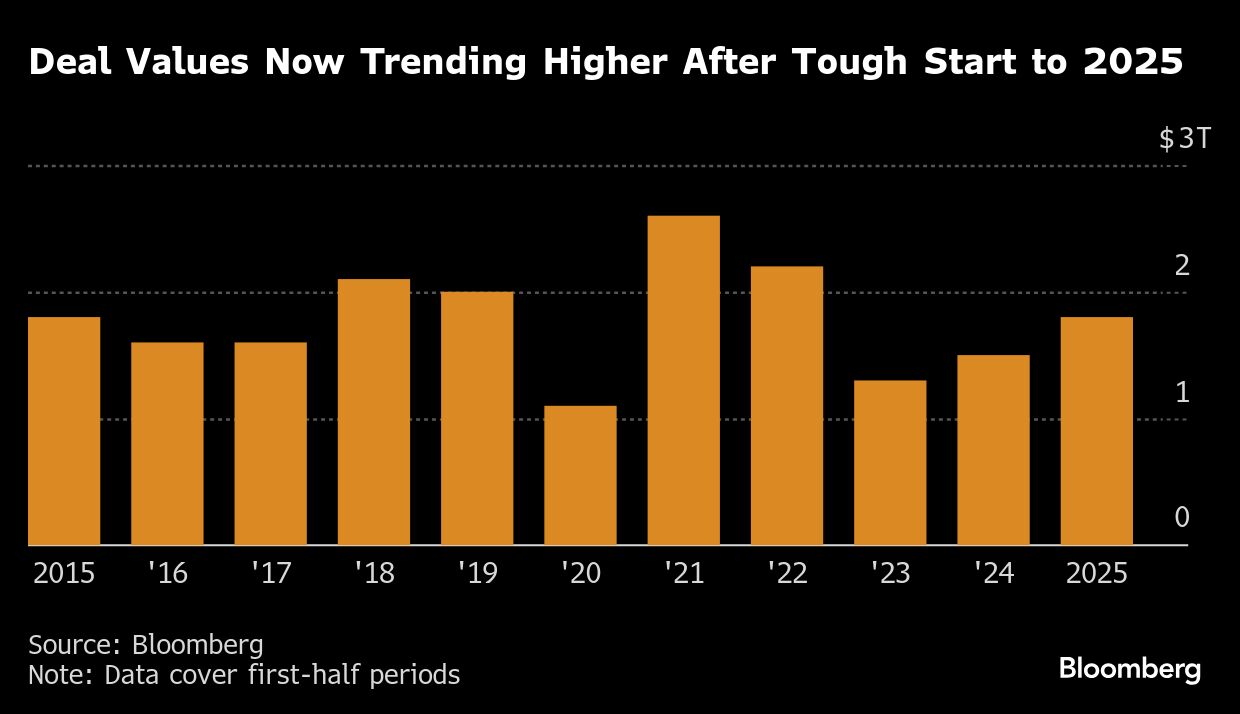
Big money takeovers of private companies helped drive mergers and acquisitions in the first half, as dealmakers got comfortable writing sizable checks in topsy-turvy markets.
More than half of the 10 largest deals announced in 2025 have involved a private target, data compiled by Bloomberg show, including the tie-up of Charter Communications Inc and Cox Communications, Alphabet Inc.’s purchase of cybersecurity firm Wiz Inc and Constellation Energy Corp’s acquisition of US power station operator Calpine Corp. All were valued at around $30 billion or more including debt.
Transactions like these and Meta Platforms Inc’s $14 billion-plus investment in data-labeling startup Scale AI have lifted the value of all deals globally by almost a fifth to $1.8 trillion, the data show.
ALSO READ: Global deal activity disappoints, M&A revenue falls as Trump pursues tariffs
“The creativity we’re seeing across deals is symptomatic of the need to unwind the massive amounts of capital tied up in privately held companies,” said Haidee Lee, global head of sponsor M&A at Goldman Sachs Group Inc.
A strong second-quarter means advisers can head into their summer breaks with more confidence about the rest of 2025. That’s despite the ongoing geopolitical and trade turmoil has at times this year set alarm bells ringing across Wall Street’s M&A desks and which could still damage sentiment going forward.

“Corporate buyers have come back in force as they look to diversify their revenue base and enhance growth,” said David Kamo, head of financial sponsor M&A at Evercore Inc. “There’s no doubt that the M&A market is open — especially in unaffected sectors like software, health-care technology and data center infrastructure.”
Trump Turnaround
Until mid-March, transaction values had been trailing 2024 levels, in large part due to the unpredictable start to Donald Trump’s second term as US president. Things took a sharp turn for the worse in early April, when Trump unleashed global tariffs that sent markets crashing and business leaders back into wait-and-see mode.
Major indexes have since recouped losses as Trump has softened some trade demands. And while the speed of announcements from his administration initially caught many on Wall Street off guard, there’s now more clarity on policy direction, according to Eric Rutkoske, global head of M&A at Guggenheim Securities LLC.
“If we continue to see moderate inflation, a healthy financing environment and a bit more geopolitical and macro certainty, we should have a very good second half,” Rutkoske said. “Those are three things that have been concerns for a while, so we don’t take it for granted.”
ALSO READ: A trade war Washington cannot win
Companies are also getting a better grasp of the US government’s approach to antitrust issues. Advisers say a return to traditional enforcement practices under Trump is emboldening companies to strike more ambitious mergers. This month, the Federal Trade Commission greenlit Omnicom Group Inc’s $13.5 billion buyout of rival advertising agency Interpublic Group on the condition it promise not to withhold online ads for political reasons.
Krishna Veeraraghavan, global co-head of the M&A group at law firm Paul Weiss Rifkind Wharton & Garrison, told Bloomberg News in a recent interview that the Omnicom-IPG settlement was interesting because it was cleared with remedies tied to conduct that was consistent with the aims of the Trump government.
Key to a sustained M&A recovery through the rest of the year will be the extent to which private equity firms can buy and sell easily. After an active first quarter that brought Sycamore Partners’ acquisition of Walgreens Boots Alliance Inc and STG Partners’ takeover of the NBA’s Boston Celtics, buyout firms have cooled their spending in recent months, Bloomberg-compiled data show.
ALSO READ: Time for US to return to rules-based trade
“With major stock indexes touching new record highs, plus the necessity of control premiums, it’s difficult for buyers of public companies to make the returns math work,” said Martin Brand, head of Blackstone Capital Partners.
Private equity firms, meanwhile, remain under pressure to return capital to investors. This quarter, GTCR struck a quick and lucrative exit from payments processor Worldpay, KKR & Co announced the sale of its stake in US fuel pipeline operator Colonial Enterprises Inc and Lone Star agreed to offload its majority interest in Portugal’s Novo Banco SA.
To be sure, private equity owners of companies continue to face challenges when looking to cash out of investments, said Brand, in part because there’s not enough dry powder in the market to buy all the assets that are up for sale.
ALSO READ: Global M&A picks up in Q1 after flurry of large deals
“Waiting for that to resolve itself magically is maybe a little like waiting for Godot,” he said. “It is much better to get in front of that and be proactive right now, in particular as markets are constructive and some of the uncertainty around policy and inflation abates.”
No major region has seen a bigger bounce in deal values this year than Asia Pacific, where the massive take private of Toyota Industries, and Nippon Telegraph and Telephone Corp’s planned purchase of data center operator NTT Data Group Corp for around $16 billion, have pumped up volumes.
Japan continues to be a standout market as its cash-rich companies change their attitudes toward expansion. Bankers are also being kept busy in India and Southeast Asia, according to Ellis Chu, head of Asia M&A at Jefferies Financial Group Inc.


